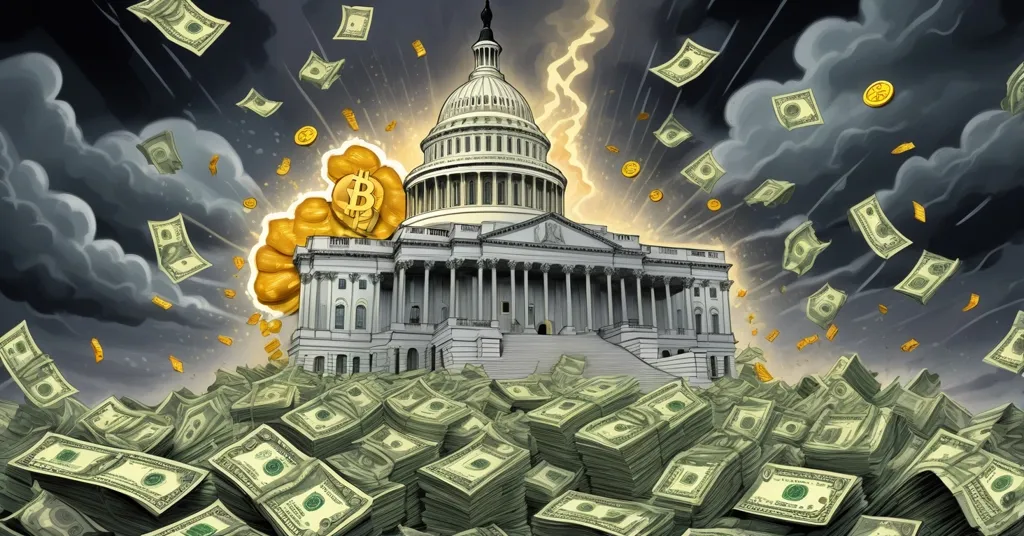Elon Musk Slams $5.1T U.S. Bill as Bankruptcy Looms: Bitcoin’s Big Moment?

Elon Musk Torches ‘One Big Beautiful Bill’ as U.S. Bankruptcy Looms: A Bitcoin Wake-Up Call
Elon Musk has unleashed a firestorm of criticism against the “One Big Beautiful Bill Act,” a sprawling piece of U.S. legislation championed by President Donald Trump, warning that it could shove the nation straight into bankruptcy. With a projected $5.1 trillion addition to the national debt over the next decade, Musk has branded the bill a “disgusting abomination” on X, reigniting a fierce debate over government spending that echoes right into the heart of the Bitcoin and crypto community.
- Debt Disaster: The bill could pile on $5.1 trillion to U.S. debt in 10 years, according to the Committee for a Responsible Federal Budget (CRFB).
- Musk’s Rage: Calls it a “disgusting abomination,” claiming a $2.5 trillion deficit surge risks national bankruptcy.
- Crypto Connection: Rising debt could weaken the dollar, potentially driving Bitcoin adoption as a hedge against fiat collapse.
The Bill’s Fiscal Fallout: A Ticking Time Bomb
Musk’s latest outburst targets the “One Big Beautiful Bill Act”, a massive legislative package that passed the House in May and is currently under intense scrutiny in the Senate. This beast of a bill combines hefty tax cuts—such as eliminating taxes on overtime pay through 2028 at a cost of $124 billion—with ramped-up spending on defense and border security ($144 billion) and brutal slashes to social programs like Medicaid, saving $273.4 billion through work requirements. The White House, via Press Secretary Karoline Leavitt, has defended it as critical for tax relief and national priorities. House Speaker Mike Johnson has also pushed back against Musk’s warnings, insisting the billionaire is flat-out wrong about the bill’s impact.
“With all due respect, Elon is simply wrong about the One Big Beautiful Bill.” — House Speaker Mike Johnson
But Musk, who recently stepped down from leading the Department of Government Efficiency (DOGE) after a 130-day stint, isn’t backing off. He’s claimed the bill will inflate the budget deficit by $2.5 trillion, though some analyses from the Committee for a Responsible Federal Budget peg the total debt impact closer to $4-5.1 trillion when interest and long-term effects are factored in. Either way, Musk sees the numbers as “crushingly unsustainable,” venting his frustration loud and clear.
“I’m sorry, but I just can’t stand it anymore.” — Elon Musk on X
For those new to the fiscal jargon, let’s break it down. National debt is the total amount the U.S. government owes its creditors—picture a household credit card bill that’s been snowballing for decades, now topping $35 trillion. The budget deficit, meanwhile, is the yearly gap between what the government spends and what it rakes in from taxes. A debt-to-GDP ratio over 120%, as we’ve seen since the 2020 pandemic spending binge, means the country owes more than it produces annually—a precarious spot not hit since World War II. Musk’s bankruptcy warning isn’t just hyperbole; it’s a red flag about a system teetering on the edge, as highlighted in his recent statements on X.
Musk’s War on Waste: Allies and Enemies
Musk isn’t a lone wolf in this fight. Fiscal conservatives like Senator Rand Paul have slammed the bill as “a huge mistake,” while Senator Mike Lee has pointed to a government spending crisis brewing since 2020, urging the Senate to overhaul the legislation. Their criticism of unchecked spending aligns with Musk’s push for efficiency, a cause he spearheaded at DOGE before exiting, though he insists the mission to cut waste will endure within government structures.
“We can and must do better.” — Senator Rand Paul
On the other side, the White House and Johnson argue the bill’s tax cuts and spending are a necessary boost for the economy, prioritizing immediate relief over the looming shadow of debt. Even President Trump has taken shots at critics like Rand Paul on Truth Social, accusing them of obstructionism. This political fracture reveals a deeper rift over America’s financial future, with Musk’s megaphone on X, as seen in online discussions, amplifying the stakes to a global audience—including us in the crypto sphere who’ve long questioned centralized financial systems.
Bitcoin’s Bullish Backdrop: Debt as a Catalyst
So, why should Bitcoin enthusiasts give a damn about this Washington squabble? Simple: fiscal recklessness of this magnitude could be a rocket booster for decentralized money. If the U.S. keeps stacking debt like a gambler doubling down on losses, the dollar’s purchasing power could erode faster than a low-value altcoin in a bear market. Bitcoin, often hailed as “digital gold,” historically thrives in such chaos, with some viewing it as a potential hedge against debt crises. Look at the 2020 stimulus flood—BTC’s price surged as inflation fears kicked in, climbing from under $10,000 to over $60,000 by late 2021. A debt crisis could similarly position Bitcoin as a safe haven outside government control, especially if the dollar’s status as the world’s reserve currency starts to wobble.
Tax relief provisions in the bill, like no tax on car loans costing $58 billion, might also free up disposable income for retail investors to dip into crypto markets. Even the measly $0.5 billion for AI and IT modernization could trickle into blockchain R&D, potentially fueling innovation in decentralized protocols. For Bitcoin maximalists, this chaos validates the need for a hard-capped, trustless currency free from meddling bureaucrats. But let’s not ignore other blockchains—Ethereum’s smart contracts could shine in decentralized lending if traditional finance falters, while Solana’s speed might attract users for microtransactions amid dollar volatility.
The Dark Side: Risks and Regulatory Shadows
Before we pop the champagne, let’s play devil’s advocate. While Bitcoin could gleam as a long-term store of value, short-term economic instability from unchecked debt might spook investors away from risk assets like cryptocurrencies. If panic sets in, we could see a flight to traditional safe havens like gold or bonds, leaving BTC and altcoins battered in the interim. Worse, a desperate government facing bankruptcy might scapegoat crypto as a speculative boogeyman, ramping up regulations to clamp down on perceived risks. Recent rhetoric from lawmakers about cracking down on digital assets during financial unrest isn’t just speculation—it’s a looming threat, raising questions about how U.S. debt levels impact Bitcoin adoption.
There’s also the ugly underbelly of economic fear: scams. Predatory stablecoins or fly-by-night token projects could exploit public panic, preying on the desperate with promises of stability or quick riches. We’ve seen this garbage before, and it’s a stain on the space. Stick to fundamentals—Bitcoin’s security, Ethereum’s established DeFi ecosystem—and don’t fall for the hype. Speaking of hype, let’s shut down the nonsense peddled by some corners of the internet claiming “BTC to $1M if the U.S. defaults.” That’s baseless shilling, not analysis. Debt crises may nudge adoption, but crypto isn’t a lottery ticket tied to every political headline. We’re here for real change, not fairy tales.
Effective Accelerationism: Chaos as a Catalyst?
Peering through the lens of effective accelerationism, there’s a case to be made for letting this fiscal mess unfold. Disaster often sparks innovation—think of the 2008 financial crisis birthing Bitcoin itself, as Satoshi Nakamoto envisioned a response to centralized mismanagement. A debt implosion could fast-track the shift to decentralized systems, not just BTC as money, but also DAO-based governance or blockchain voting as alternatives to failing state structures. For crypto OGs, this aligns with the original cypherpunk ethos of dismantling broken systems through tech.
Yet, we can’t gloss over the human toll. A U.S. bankruptcy scenario isn’t just numbers on a spreadsheet—it’s pensions vanishing, savings wiped out, lives upended. While Bitcoin maximalists might nod at the validation of sound money, and altcoin ecosystems carve out niches in a post-dollar world, the road to that future could be brutal. Decentralization is our north star, but we must acknowledge the wreckage along the way.
What’s Next for Crypto in This Fiscal Mess?
Musk’s scathing critique of the “One Big Beautiful Bill Act,” as detailed in his recent public comments and further elaborated in his statements on fiscal policy, isn’t just a billionaire’s gripe—it’s a spotlight on a rotting centralized system that crypto was built to challenge. Whether the Senate guts this bill or passes it unchanged, the battle over America’s financial soul will ripple into our realm of digital assets. If debt keeps spiraling, expect more everyday folks to ask how to stack sats as their dollars buy less bread each day. For now, Musk has ensured we’re all paying attention, and in the wild west of crypto, vigilance is everything.
Key Takeaways and Questions for Crypto Enthusiasts
- What exactly is the “One Big Beautiful Bill Act” and why is it stirring controversy?
It’s a U.S. legislative package adding up to $5.1 trillion to the national debt over a decade through tax cuts and spending hikes. Its controversy stems from bankruptcy risks flagged by Elon Musk and others, spotlighting fiscal irresponsibility that could impact the dollar’s value.
- Why is Elon Musk so vehemently against this bill?
Musk calls it a “disgusting abomination,” warning its $2.5 trillion deficit spike could bankrupt the U.S., clashing with his advocacy for government efficiency and resonating with crypto’s distrust of centralized overreach.
- How could escalating U.S. debt influence Bitcoin and crypto adoption?
Rising debt often fuels inflation and dollar devaluation, historically boosting Bitcoin as a hedge. A crisis could drive more people and institutions to crypto for financial sovereignty, though volatility might deter some initially.
- Does this bill offer any silver lining for the blockchain or crypto sector?
Small allocations like $0.5 billion for IT modernization could support blockchain innovation, and tax relief might increase funds for crypto investments, though these are dwarfed by broader economic risks.
- What dangers does this fiscal policy pose to the crypto market?
Short-term instability could push investors away from risk assets like crypto, and a debt crisis might trigger harsher regulations. Scams exploiting fear could also tarnish the space, demanding caution from users.
- Who stands with Musk, and who’s pushing back in this debate?
Senators Rand Paul and Mike Lee back Musk’s fiscal warnings, echoing crypto-friendly libertarian views, while the White House and House Speaker Mike Johnson defend the bill for its stimulus, prioritizing short-term gains over debt concerns.



